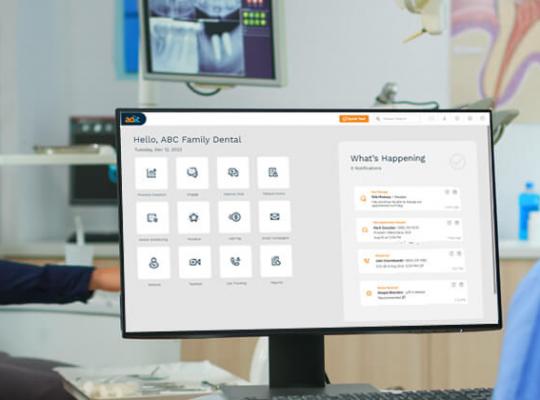Dental Recordkeeping: Best Practices to Keep Patient Data Straight

Maintaining patient records is a time-consuming task for many dental practices. And in a busy office, it's easy for inconsistencies and errors to occur that can lead to significant frustration for your dentists and the patients you serve.
Just like the medical industry, dentistry has a high standard of care which requires detailed recordkeeping to ensure your office delivers the best possible results and patient experience. Because dental records act as both medical and legal documentation, it's vital that your team understands how to properly acquire, organize and share information per your organizational needs and those of the Health Insurance Portability and Accountability Act (HIPAA).
Whether you're just establishing your first dental practice or want to ensure your current recordkeeping process is appropriate, this article can provide insight into the basics of this daily task and offer some tips to make this process more efficient.
Creating an Efficient Recordkeeping Strategy

How often have you or other dental professionals in your office been told you're putting too much information in patient records? While this advice is meant well, it can lead to cutting corners and forming bad habits.
These documents are evidence of care, the steps taken to treat a condition, the patient's treatment progress, and more. This information is crucial to ensure your office can justify its reimbursement requests and ensure they get paid promptly.
To achieve this goal, your practice needs a recordkeeping strategy that everyone unequivocally follows to the letter. Not just for your office's benefit but for compliance with industry and legal requirements. Below is an overview of best practices to ensure your team consistently creates sufficient dental records.
Stick to the Facts
The primary characteristics of a good dental record are that it is complete, concise, direct, and unambiguous. Information going in your patient's file should be clinical and devoid of unnecessary commentary. Anything that isn't professional in tone could be used against your office if a dissatisfied patient decides to sue.
Details you should keep in a dental record include:
- Diagnostic data
- Health history
- Clinical notation
- Treatments offered and performed
- Patient-related communications (including cancellations)
Whether a treatment provider reviews this documentation or an attorney, the record should only be factual and straightforward, leaving nothing up to interpretation.
Be Careful When Correcting Mistakes or Omissions

Something in a patient record that seems insignificant can become a problem in the blink of an eye. Never delete, white out, or erase things you enter, and do not leave blank spaces with the plan of filling them out in the future.
These small things can make someone imagine that you are improperly altering records. For traditional paper-based recordkeeping, your team should draw a small line through mistakes, then date and initial for verification.
Maintain the Strictest Confidentiality

People are fans of privacy, generally speaking. This fact especially goes for healthcare, dentistry included. If you carry a paper copy of patient records, you should ensure a cover sheet protects the history.
123 Dental strengthens patient communication and raises confirmations 20% with Adit Tired of second-guessing your daily schedule? When multiple disconnected systems created missed calls, chaotic scheduling, and slow reviews,...
Download Case StudyWhen team members access patient information from a desk or other publically viewable area, they must keep their screens turned away from the public and exit the program once they have finished.
In addition, all confidential information should be marked as such and kept out of unauthorized view. Becoming a digital dental office and approaching your EHR (Electronic Health Records) and charting process electronically can eliminate the risks that come with physical paperwork.
For instance, Adit provides a complete PMS (Practice Management System) platform that lets your team and patients communicate privately through secure messaging. This means you eliminate the need for paper copies and can access information through a discreet access point like a computer or tablet.
Check Your Entries for Mistakes
Review all entries and ensure that the dentist's intent is clear. There are many things that can go wrong if patient records aren't kept as flawless as possible. A prime example of inaccurate record keeping is when insurance information is either out-of-date or entered inaccurately. This is a frequent cause for claim denials.
Also, there are often legal reasons for needing well-maintained dental records, such as for litigation or body identification. If a patient's radiographs aren't properly stored in their file or were misplaced, a coroner may not be able to complete their case.
Many of these potential issues are avoidable if your practice management software automates this process. Instead of filling out tons of paperwork manually, electronic forms can be completed and submitted via a secure web connection.
Once a file gets uploaded, this data, insurance details, and contact information can be updated immediately and stored. Your dentists and support team can also update visit information in real time, so there is never a backlog.
Financials Don't Belong in a Patient's EHR
Nothing to do with finances belongs in a dental record but in a separate database or folder. This restriction includes payment records, benefit details, or other monetary information. Mixing the two can give the wrong impression—one that a patient’s ability or inability to pay creates a bias in the evaluation and diagnosis for treatment.
Also, any future transfer of patient charts to other professionals should only have treatment notes; no nonmedical information is necessary.
Treatment Refusals Always Need Documentation
No matter how well-founded your treatment recommendations are, patients don't always agree. In situations where they won't comply, it's a crucial detail to note in their records. Take notes on discussions regarding any benefits and risks and state why a patient chose against the suggested treatment.
Don't Let Dissatisfaction Go Ignored

In this age of Yelp and Google reviews, satisfying dental patients is essential. Dissatisfied patrons pose a significant risk because making an adverse claim against a practice is easy, and damage can immediately be felt.
For example, a patient leaves your office claiming that their dentist didn't provide enough anesthesia during a root canal. Before leaving your parking lot, they can publish a scathing one-star review of your practice on multiple platforms. You haven’t even cleaned the room they were in yet, and your office has already been drug through the mud.
Make a point to always follow up with patients on their treatment experience before they leave and note any questions or concerns in their chart. This establishes a record demonstrating the effort your practice is making to handle the situation and track the details of the issue.
Attach Email and Other Communications to the Record
Use caution when sharing information with your dental patients. Record notes in their chart about any communications you've sent and the purpose for doing so.
For example, if you still haven't received insurance information, note that your team has sent three email reminders requesting it. This can be helpful when a claim gets denied, and the patient doesn't understand why. You can show multiple requests for their coverage details and that your office never received a reply.
The number one email rule is always to be specific, clear, and never assume that the other party knows what you are talking about. It's also smart to attach copies of these emails to the patient’s chart. Many practice management platforms, like Adit, can automatically add this information to their file and make it available for download in a patient portal.
Another rule is to always have permission to communicate through email or text messaging in the first place. Provide an informed consent form for patients to read and sign. Include a copy of this agreement in their record.
Additionally, consult with a legal partner to create a disclaimer attachment for every email sent. This statement should also inform any party who mistakenly receives the message what to do with the correspondence.
On a final note, remember that your patient communications are part of the record. Don’t mistakenly think these messages are private. This includes emails and internal chats among employees in your practice. These are the first things attorneys will request if your office goes into litigation for any reason.
If having your email read in court would embarrass you, then the best practice would be not to send the communication in the first place!
Know When to Retain and Destroy Patient Records
There are HIPAA and other applicable laws guiding the destruction of confidential patient information. According to the American Dental Association, you can expect to retain dental records for 5 - 7 years on average, though some states have a standard of just two years or up to ten. It depends on where your practice operates.
Most, if not all, traditional documentation can be shredded, preferably by a professional shredding service. However, disposing of X-rays presents a special problem since destroying radiographs presents health risks that normal paper files do not. Contact a document management company to find out the best way to dispose of these.
These disposal concerns could be a thing of the past if you convert to digital recordkeeping strategies using tech-forward practice management software. Many PMS platforms can automatically send, receive, update, and store your EHR in a cloud-based server.
It should be mentioned that deleting electronic files has its own set of rules to keep in mind. Simply deleting a file doesn't guarantee the data no longer exists. Check with your PMS provider for details about removing expired patient data from your database. Many times there is a specific function to achieve this without needing the assistance of an IT specialist.
Why Your Dental Record-Keeping Process Needs Better Management

Once upon a time, a dentist practiced for almost 40 years, long before the invention of EHR and databases. This meant there were years and years of boxes marked with letters of the alphabet and numbers stuffed away, taking up valuable office space. No matter how hard he tried, many of these files were not as confidential as they should have been and would get misplaced.
Nowadays, this scenario could not only cost you valuable production time but also incur legal consequences for non-compliance. Thank goodness that recordkeeping has improved dramatically since the days of boxes, alphabets, and numbers.
In a perfect world, your existing dental PMS would organize all of this data automatically, ensuring it's accurate, timely, complete, and accessible. If you still rely on paper and file cabinets to manage your records, or your team still spends hours on manual data entry, you're missing out.
Here’s why a technology platform like Adit can revolutionize your practice by automating your EHR process:
Efficiency

Records can and should be stored somewhere offsite, preferably in a digital database. Moving unused files offsite frees up physical space can save money if relying on a cloud-based database platform, and boosts employee productivity.
It's Easier to Play by the Rules
Recordkeeping regulations can be a real thorn in the side of dental practices—especially if they struggle to be consistent when creating, organizing, and updating patient information.
Practice management platforms like Adit create an automated system of organization and compliance that reduces legal liability.
Improved Record Accuracy

Imagine the simplicity of electronic patient forms, automated reminders and follow-up requests, and up-to-date coding menus, all controlled under a single cloud-based application that can seamlessly integrate with your existing system.
Create a fully digital EHR experience that provides secure completion and submission of patient visit information.
Simplify Your Dental Recordkeeping Tasks with Adit
Sometimes the things that have the largest impact on your bottom line are seemingly inconsequential. Managing records isn’t on the mind of busy dentists, but having them properly organized and complete can have a massive effect on business.
Poor record and document management fuel ongoing regulatory issues. End all of that quickly by automating your office’s record-keeping. With Adit's end-to-end practice management platform that boasts a robust offering of 15+ digital tools, your office can create a data strategy that eliminates (or at least reduces) human error and lost paperwork.
- Adit Voice
- Patient Recall
- Call Tracking
- Telemed
- Pozative Reviews
- Adit Pay
- Internal Chat
- 2-Way Patient Messaging
- Practice Analytics
- Online Scheduling
- Patient Forms
- Appointment Reminders
- And so much more!
Every day your company is creating records that will affect the future and decisions made. The hard work of the past often got lost in the shuffle. Take time now to properly file your records so that your hard work will pay off in the future. Request your free demo to find out how Adit can make recordkeeping the easiest part of your day.
more about Adit?
Say goodbye to the hassle of using multiple tools. Adit centralizes your calls, texts, payments, reviews, and scheduling into one powerful dashboard. Simplify your operations and boost patient satisfaction today.
Schedule a DemoAfter spending 10 years helping dentists grow their practices, Ali witnessed the time and money dentists were wasting on outdated, fragmented technology that negatively impacted sustainable growth and the overall patient experience. So he developed Adit - a user-friendly SaaS platform that centralizes everything a practice needs to operate and simplifies the business of dentistry so doctors can get back to the medicine.
Get a $25 Gift Card when you take a demo
Schedule a DemoGet a $50 Gift Card
when you take a demo
Looks like you're out of bounds!
Hey there! Your current location falls outside Adit's area of operation. If this is unexpected, try disabling your VPN and refresh your page. For further assistance or to book a live demo, connect with us at 832-225-8865.
February 22 Amazon Demo Promo
Terms and Conditions
Last Updated: February 22, 2026Offer ends February 25, 2026, and is limited to prospective customers who sign an annual agreement before February 28, 2026. Gift card will be emailed to the company owner or established representative within 4 weeks of signing the annual agreement. Offer may not be combined with any other offers and is limited to one (1) gift card per office. Offer is not available to current customers or to prospective customers or individuals that have participated in a Adit demo during the prior six (6) months. Recipient is responsible for all taxes and fees associated with receipt and/or use of the gift card as well as reporting the receipt of the gift card as required under applicable federal and state laws. Adit is not responsible for and will not replace the gift card if it is lost or damaged, is not used within any applicable timeframe, or is misused by the recipient. Adit is not responsible for any injury or damage to persons or property which may be caused, directly or indirectly, in whole or in part, from the recipient’s participation in the promotion or receipt or use of the gift card. Recipient agrees to indemnify, defend and hold harmless Adit from and against any and all claims, expenses, and liabilities (including reasonable attorney’s fees) arising out of or relating to a recipient’s participation in the promotion and/or recipient’s acceptance, use or misuse of the gift card. This offer is sponsored by Adit Communications, Inc. and is in no way sponsored, endorsed or administered by, or associated with Amazon.
Thank You!
We appreciate your interest! Adit AI will be calling you in the next few minutes!
Why Adit?
Cut your software bill by up to 60% when you merge everything your dental office needs to run under one roof.
Centralize Communications
- Phones & TeleMed
- Emails & eFax
- Texting & Reminders
- Call Tracking and more!
Streamline Operations
- Patient Forms
- Online Scheduling
- Payments
- Reviews and more!
Boost Production
- Performance Dashboards
- Morning Huddle
- Claims & Collections
- Patient Profiles
- Follow Up Lists
- Year Over Year Metrics
Acquire More Patients
- Digital Marketing
- Website Design
- SEO
- Google Ads
- Facebook Ads
when you sign up with Adit!
Sign up by filling out the form







